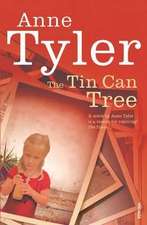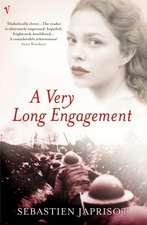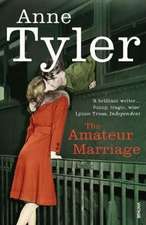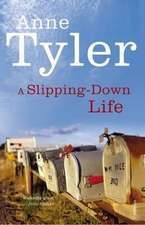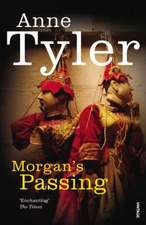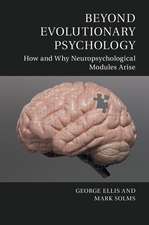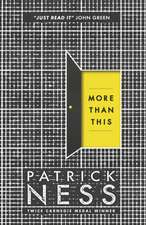The Accidental Tourist
Autor Anne Tyleren Limba Engleză Paperback – 4 mai 1995
| Toate formatele și edițiile | Preț | Express |
|---|---|---|
| Paperback (2) | 54.72 lei 26-32 zile | +21.67 lei 7-13 zile |
| Vintage Publishing – 4 mai 1995 | 54.72 lei 26-32 zile | +21.67 lei 7-13 zile |
| BALLANTINE BOOKS – 31 mar 2002 | 109.33 lei 17-23 zile | +9.47 lei 7-13 zile |
Preț: 54.72 lei
Preț vechi: 64.32 lei
-15% Nou
Puncte Express: 82
Preț estimativ în valută:
10.47€ • 10.96$ • 8.66£
10.47€ • 10.96$ • 8.66£
Carte disponibilă
Livrare economică 20-26 martie
Livrare express 01-07 martie pentru 31.66 lei
Preluare comenzi: 021 569.72.76
Specificații
ISBN-13: 9780099480013
ISBN-10: 0099480018
Pagini: 416
Dimensiuni: 131 x 201 x 27 mm
Greutate: 0.29 kg
Editura: Vintage Publishing
Locul publicării:United Kingdom
ISBN-10: 0099480018
Pagini: 416
Dimensiuni: 131 x 201 x 27 mm
Greutate: 0.29 kg
Editura: Vintage Publishing
Locul publicării:United Kingdom
Notă biografică
Anne Tyler was born in Minneapolis, Minnesota, in 1941 and grew up in Raleigh, North Carolina. Her bestselling novels include Breathing Lessons, The Accidental Tourist, Dinner at the Homesick Restaurant, Ladder of Years, Back When We Were Grown-ups, Digging to America, A Spool of Blue Thread, Clock Dance, Redhead by the Side of the Road and French Braid.
In 1989 she won the Pulitzer Prize; in 1994 she was nominated by Roddy Doyle and Nick Hornby as 'the greatest novelist writing in English'; and in 2012 she received the Sunday Times Award for Literary Excellence. In 2015 A Spool of Blue Thread was shortlisted for the Baileys Women's Prize for Fiction and the Booker Prize; and in 2020 Redhead by the Side of the Road was longlisted for the Booker Prize.
In 1989 she won the Pulitzer Prize; in 1994 she was nominated by Roddy Doyle and Nick Hornby as 'the greatest novelist writing in English'; and in 2012 she received the Sunday Times Award for Literary Excellence. In 2015 A Spool of Blue Thread was shortlisted for the Baileys Women's Prize for Fiction and the Booker Prize; and in 2020 Redhead by the Side of the Road was longlisted for the Booker Prize.
Extras
They were supposed to stay at the beach a week, but neither of them had the heart for it and they decided to come back early. Macon drove. Sarah sat next to him, leaning her head against the side window. Chips of cloudy sky showed through her tangled brown curls.
Macon wore a formal summer suit, his traveling suit—much more logical for traveling than jeans, he always said. Jeans had those stiff, hard seams and those rivets. Sarah wore a strapless terry beach dress. They might have been returning from two entirely different trips. Sarah had a tan but Macon didn’t. He was a tall, pale, gray-eyed man, with straight fair hair cut close to his head, and his skin was that thin kind that easily burns. He’d kept away from the sun during the middle part of every day.
Just past the start of the divided highway, the sky grew almost black and several enormous drops spattered the windshield. Sarah sat up straight. “Let’s hope it doesn’t rain,” she said.
“I don’t mind a little rain,” Macon said.
Sarah sat back again, but she kept her eyes on the road.
It was a Thursday morning. There wasn’t much traffic. They passed a pickup truck, then a van all covered with stickers from a hundred scenic attractions. The drops on the windshield grew closer together. Macon switched his wipers on. Tick-swoosh, they went—a lulling sound; and there was a gentle patter on the roof. Every now and then a gust of wind blew up. Rain flattened the long, pale grass at the sides of the road. It slanted across the boat lots, lumberyards, and discount furniture outlets, which already had a darkened look as if here it might have been raining for some time.
“Can you see all right?” Sarah asked.
“Of course,” Macon said. “This is nothing.”
They arrived behind a trailer truck whose rear wheels sent out arcs of spray. Macon swung to the left and passed. There was a moment of watery blindness till the truck had dropped behind. Sarah gripped the dashboard with one hand.
“I don’t know how you can see to drive,” she said.
“Maybe you should put on your glasses.”
“Putting on my glasses would help you to see?”
“Not me; you,” Macon said. “You’re focused on the windshield instead of the road.”
Sarah continued to grip the dashboard. She had a broad, smooth face that gave an impression of calm, but if you looked closely you’d notice the tension at the corners of her eyes.
The car drew in around them like a room. Their breaths fogged the windows. Earlier the air conditioner had been running and now some artificial chill remained, quickly turning dank, carrying with it the smell of mildew. They shot through an underpass. The rain stopped completely for one blank, startling second. Sarah gave a little gasp of relief, but even before it was uttered, the hammering on the roof resumed. She turned and gazed back longingly at the underpass. Macon sped ahead, with his hands relaxed on the wheel.
“Did you notice that boy with the motorcycle?” Sarah asked. She had to raise her voice; a steady, insistent roaring sound engulfed them.
“What boy?”
“He was parked beneath the underpass.”
“It’s crazy to ride a motorcycle on a day like today,” Macon said. “Crazy to ride one any day. You’re so exposed to the elements.”
“We could do that,” Sarah said. “Stop and wait it out.”
“Sarah, if I felt we were in the slightest danger I’d have pulled over long ago.”
“Well, I don’t know that you would have,” Sarah said.
They passed a field where the rain seemed to fall in sheets, layers and layers of rain beating down the cornstalks, flooding the rutted soil. Great lashings of water flung themselves at the windshield. Macon switched his wiper blades to high.
“I don’t know that you really care that much,” Sarah said. “Do you?”
Macon said, “Care?”
“I said to you the other day, I said, ‘Macon, now that Ethan’s dead I sometimes wonder if there’s any point to life.’ Do you remember what you answered?”
“Well, not offhand,” Macon said.
“You said, ‘Honey, to tell the truth, it never seemed to me there was all that much point to begin with.’ Those were your exact words.”
“Um . . .”
“And you don’t even know what was wrong with that.”
“No, I guess I don’t,” Macon said.
He passed a line of cars that had parked at the side of the road, their windows opaque, their gleaming surfaces bouncing back the rain in shallow explosions. One car was slightly tipped, as if about to fall into the muddy torrent that churned and raced in the gully. Macon kept a steady speed.
“You’re not a comfort, Macon,” Sarah said.
“Honey, I’m trying to be.”
“You just go on your same old way like before. Your little routines and rituals, depressing habits, day after day. No comfort at all.”
“Shouldn’t I need comfort too?” Macon asked. “You’re not the only one, Sarah. I don’t know why you feel it’s your loss alone.”
“Well, I just do, sometimes,” Sarah said.
They were quiet a moment. A wide lake, it seemed, in the center of the highway crashed against the underside of the car and slammed it to the right. Macon pumped his brakes and drove on.
“This rain, for instance,” Sarah said. “You know it makes me nervous. What harm would it do to wait it out? You’d be showing some concern. You’d be telling me we’re in this together.”
Macon peered through the windshield, which was streaming so that it seemed marbled. He said, “I’ve got a system, Sarah. You know I drive according to a system.”
“You and your systems!”
“Also,” he said, “if you don’t see any point to life, I can’t figure why a rainstorm would make you nervous.”
Sarah slumped in her seat.
“Will you look at that!” he said. “A mobile home’s washed clear across that trailer park.”
“Macon, I want a divorce,” Sarah told him.
Macon braked and glanced over at her. “What?” he said. The car swerved. He had to face forward again. “What did I say?” he asked. “What did it mean?”
“I just can’t live with you anymore,” Sarah said.
Macon went on watching the road, but his nose seemed sharper and whiter, as if the skin of his face had been pulled tight. He cleared his throat. He said, “Honey. Listen. It’s been a hard year. We’ve had a hard time. People who lose a child often feel this way; everybody says so; everybody says it’s a terrible strain on a marriage—”
“I’d like to find a place of my own as soon as we get back,” Sarah told him.
“Place of your own,” Macon echoed, but he spoke so softly, and the rain beat so loudly on the roof, it looked as if he were only moving his lips. “Well,” he said. “All right. If that’s what you really want.”
“You can keep the house,” Sarah said. “You never did like moving.”
For some reason, it was this that made her finally break down. She turned away sharply. Macon switched his right blinker on. He pulled into a Texaco station, parked beneath the overhang, and cut off the engine. Then he started rubbing his knees with his palms. Sarah huddled in her corner. The only sound was the drumming of rain on the overhang far above them.
Macon wore a formal summer suit, his traveling suit—much more logical for traveling than jeans, he always said. Jeans had those stiff, hard seams and those rivets. Sarah wore a strapless terry beach dress. They might have been returning from two entirely different trips. Sarah had a tan but Macon didn’t. He was a tall, pale, gray-eyed man, with straight fair hair cut close to his head, and his skin was that thin kind that easily burns. He’d kept away from the sun during the middle part of every day.
Just past the start of the divided highway, the sky grew almost black and several enormous drops spattered the windshield. Sarah sat up straight. “Let’s hope it doesn’t rain,” she said.
“I don’t mind a little rain,” Macon said.
Sarah sat back again, but she kept her eyes on the road.
It was a Thursday morning. There wasn’t much traffic. They passed a pickup truck, then a van all covered with stickers from a hundred scenic attractions. The drops on the windshield grew closer together. Macon switched his wipers on. Tick-swoosh, they went—a lulling sound; and there was a gentle patter on the roof. Every now and then a gust of wind blew up. Rain flattened the long, pale grass at the sides of the road. It slanted across the boat lots, lumberyards, and discount furniture outlets, which already had a darkened look as if here it might have been raining for some time.
“Can you see all right?” Sarah asked.
“Of course,” Macon said. “This is nothing.”
They arrived behind a trailer truck whose rear wheels sent out arcs of spray. Macon swung to the left and passed. There was a moment of watery blindness till the truck had dropped behind. Sarah gripped the dashboard with one hand.
“I don’t know how you can see to drive,” she said.
“Maybe you should put on your glasses.”
“Putting on my glasses would help you to see?”
“Not me; you,” Macon said. “You’re focused on the windshield instead of the road.”
Sarah continued to grip the dashboard. She had a broad, smooth face that gave an impression of calm, but if you looked closely you’d notice the tension at the corners of her eyes.
The car drew in around them like a room. Their breaths fogged the windows. Earlier the air conditioner had been running and now some artificial chill remained, quickly turning dank, carrying with it the smell of mildew. They shot through an underpass. The rain stopped completely for one blank, startling second. Sarah gave a little gasp of relief, but even before it was uttered, the hammering on the roof resumed. She turned and gazed back longingly at the underpass. Macon sped ahead, with his hands relaxed on the wheel.
“Did you notice that boy with the motorcycle?” Sarah asked. She had to raise her voice; a steady, insistent roaring sound engulfed them.
“What boy?”
“He was parked beneath the underpass.”
“It’s crazy to ride a motorcycle on a day like today,” Macon said. “Crazy to ride one any day. You’re so exposed to the elements.”
“We could do that,” Sarah said. “Stop and wait it out.”
“Sarah, if I felt we were in the slightest danger I’d have pulled over long ago.”
“Well, I don’t know that you would have,” Sarah said.
They passed a field where the rain seemed to fall in sheets, layers and layers of rain beating down the cornstalks, flooding the rutted soil. Great lashings of water flung themselves at the windshield. Macon switched his wiper blades to high.
“I don’t know that you really care that much,” Sarah said. “Do you?”
Macon said, “Care?”
“I said to you the other day, I said, ‘Macon, now that Ethan’s dead I sometimes wonder if there’s any point to life.’ Do you remember what you answered?”
“Well, not offhand,” Macon said.
“You said, ‘Honey, to tell the truth, it never seemed to me there was all that much point to begin with.’ Those were your exact words.”
“Um . . .”
“And you don’t even know what was wrong with that.”
“No, I guess I don’t,” Macon said.
He passed a line of cars that had parked at the side of the road, their windows opaque, their gleaming surfaces bouncing back the rain in shallow explosions. One car was slightly tipped, as if about to fall into the muddy torrent that churned and raced in the gully. Macon kept a steady speed.
“You’re not a comfort, Macon,” Sarah said.
“Honey, I’m trying to be.”
“You just go on your same old way like before. Your little routines and rituals, depressing habits, day after day. No comfort at all.”
“Shouldn’t I need comfort too?” Macon asked. “You’re not the only one, Sarah. I don’t know why you feel it’s your loss alone.”
“Well, I just do, sometimes,” Sarah said.
They were quiet a moment. A wide lake, it seemed, in the center of the highway crashed against the underside of the car and slammed it to the right. Macon pumped his brakes and drove on.
“This rain, for instance,” Sarah said. “You know it makes me nervous. What harm would it do to wait it out? You’d be showing some concern. You’d be telling me we’re in this together.”
Macon peered through the windshield, which was streaming so that it seemed marbled. He said, “I’ve got a system, Sarah. You know I drive according to a system.”
“You and your systems!”
“Also,” he said, “if you don’t see any point to life, I can’t figure why a rainstorm would make you nervous.”
Sarah slumped in her seat.
“Will you look at that!” he said. “A mobile home’s washed clear across that trailer park.”
“Macon, I want a divorce,” Sarah told him.
Macon braked and glanced over at her. “What?” he said. The car swerved. He had to face forward again. “What did I say?” he asked. “What did it mean?”
“I just can’t live with you anymore,” Sarah said.
Macon went on watching the road, but his nose seemed sharper and whiter, as if the skin of his face had been pulled tight. He cleared his throat. He said, “Honey. Listen. It’s been a hard year. We’ve had a hard time. People who lose a child often feel this way; everybody says so; everybody says it’s a terrible strain on a marriage—”
“I’d like to find a place of my own as soon as we get back,” Sarah told him.
“Place of your own,” Macon echoed, but he spoke so softly, and the rain beat so loudly on the roof, it looked as if he were only moving his lips. “Well,” he said. “All right. If that’s what you really want.”
“You can keep the house,” Sarah said. “You never did like moving.”
For some reason, it was this that made her finally break down. She turned away sharply. Macon switched his right blinker on. He pulled into a Texaco station, parked beneath the overhang, and cut off the engine. Then he started rubbing his knees with his palms. Sarah huddled in her corner. The only sound was the drumming of rain on the overhang far above them.
Recenzii
“INDISPUTABLY HER BEST BOOK . . .
It leaves one aching with pleasure and pain.”
–The Washington Post
“Hilarious . . . and touching . . . Anne Tyler is a wise and perceptive writer with a warm understanding of human foibles.”
–St. Louis Post-Dispatch
“Comic . . . Sweetly perverse . . . A novel animated by witty invention and lively personalities.”
–Time
“Anne Tyler [is] covering common ground with uncommon insight. . . . Convincingly real.”
–People
It leaves one aching with pleasure and pain.”
–The Washington Post
“Hilarious . . . and touching . . . Anne Tyler is a wise and perceptive writer with a warm understanding of human foibles.”
–St. Louis Post-Dispatch
“Comic . . . Sweetly perverse . . . A novel animated by witty invention and lively personalities.”
–Time
“Anne Tyler [is] covering common ground with uncommon insight. . . . Convincingly real.”
–People


